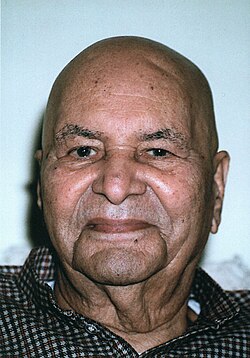This article has multiple issues. Please help improve it or discuss these issues on the talk page . (Learn how and when to remove these messages)
|
H. W. L. Poonja | |
|---|---|
 H. W. L. Poonja, often known as "Papaji" | |
| Personal life | |
| Born | Hariwansh Lal Poonja 13 October 1910 (or later) |
| Died | 6 September 1997 (aged 86 or 87) Lucknow, India |
| Nationality | Indian |
| Religious life | |
| Religion | Hinduism |
| Philosophy | Advaita Vedanta |
| Religious career | |
| Guru | Bhagavan Sri Ramana Maharshi |
No teaching, no teacher, no student.
| Part of a series on |
| Advaita |
|---|
| |
Hariwansh Lal Poonja ( /ˈpʊndʒə/ ; born 13 October 1910 (or later) in Punjab, British India – 6 September 1997 in Lucknow, India) was an Indian sage. Poonja was called "Poonjaji" or "Papaji" /ˈpɑːpɑːdʒi/ by devotees. He was a key figure in the Neo-Advaita movement.